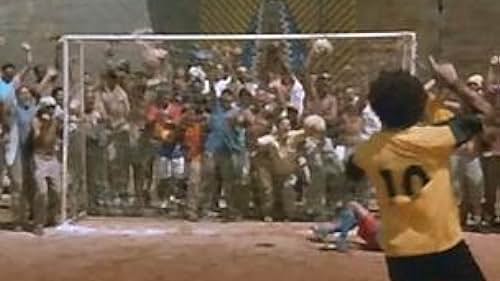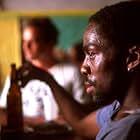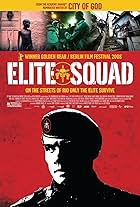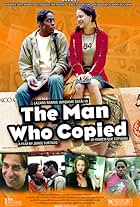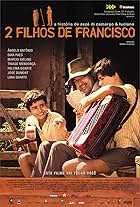Stories of crime, revenge, love, and friendship at the Carandiru Penitentiary, the largest prison in Latin America.Stories of crime, revenge, love, and friendship at the Carandiru Penitentiary, the largest prison in Latin America.Stories of crime, revenge, love, and friendship at the Carandiru Penitentiary, the largest prison in Latin America.
- Awards
- 16 wins & 33 nominations
Enrique Diaz
- Gilson
- (as Enrique Díaz)
Aida Leiner
- Rosirene
- (as Aída Leiner)
Storyline
Did you know
- TriviaDr. Dráuzio Varella wrote the original book at the encouragement of a patient he was treating for lymphatic cancer. That very patient happened to be Hector Babenco, who recovered and went on to direct the film adaptation.
- GoofsDuring the riot, as the inmates are running up the stairs of the cell block shortly after the riot squad has entered, one inmate can be seen wearing a T-Shirt of hip-hop group the Wu-Tang Clan. The group only formed in the year the riot took place (1992), and did not release their first widely available album (36 Chambers - Enter the Wu-Tang) until the following year. It is unlikely they would at this time have had a following in Brazil, nor would merchandise be available.
- Quotes
Lady Di: I've come to take the test.
Médico - Physician: Please, take a seat. First, I'd like to ask you a few questions, Lady Di.
Lady Di: I've seen this movie before, doctor. I've never needed a blood transfusion and I never pierce my veins. The only drug I use is a joint now and then... when I watch TV or for a little romance.
Médico - Physician: And partners, how many?
Lady Di: Oh, about 2000.
- ConnectionsFeatured in 2005 Glitter Awards (2005)
Featured review
Despite what some reviews and reviewers state, Carandiru is, for the large part, gloriously human and humane, without ever resorting to mawkish sentimentality. The story is based on a real event and when I saw it on TV some years ago and I so much wanted to see it again, I bought the DVD, now cheap.
Yes, these characters are a handful of long-term convicts in one of largest prisons in the world - 7000 of them, in one (in San Pualo, Brazil), that's designed for 'only' 4,000 and we are introduced to them and their frank, matter-of-fact lives as they describe their drug and sex life 'inside' to the wonderfully open and compassionate doctor ( Luiz Carlos Vasconcelos). It's from his perspective as, part of his training, he's thrown into the deep end as he tries to treat and educate prisoners about AIDS.
Amongst the knowing humour, there are tales of anguish, violence and heartache with the main character's stories being run as flashbacks. Most of the crime is petty but circumstance and poverty has dumped most of these damaged people into one huge melting pot, of squalor, STD's and drugs. One finds it surprisingly easy to be open and impartial about situations that could make your toes curl.
Despite the vivid colours used and the Latin music that gets played in and amongst this tapestry of a human jigsaw, where few of the pieces fit, mounting signs reveal an underbelly of unrest, a pressure-cooker that's about to boil over and when it does and armed police march in, the film turns dark, angry and really hits the viewer. I won't say why, though the closing epilogues do (very) partially redress some of what went on.
This is essential Brazilian drama. Gritty, hard-hitting, yes but if you've got the stomach for the excellent City of God, you'll have no trouble here. Buy it, watch it, you'll feel like a proper human being, I promise you.
Yes, these characters are a handful of long-term convicts in one of largest prisons in the world - 7000 of them, in one (in San Pualo, Brazil), that's designed for 'only' 4,000 and we are introduced to them and their frank, matter-of-fact lives as they describe their drug and sex life 'inside' to the wonderfully open and compassionate doctor ( Luiz Carlos Vasconcelos). It's from his perspective as, part of his training, he's thrown into the deep end as he tries to treat and educate prisoners about AIDS.
Amongst the knowing humour, there are tales of anguish, violence and heartache with the main character's stories being run as flashbacks. Most of the crime is petty but circumstance and poverty has dumped most of these damaged people into one huge melting pot, of squalor, STD's and drugs. One finds it surprisingly easy to be open and impartial about situations that could make your toes curl.
Despite the vivid colours used and the Latin music that gets played in and amongst this tapestry of a human jigsaw, where few of the pieces fit, mounting signs reveal an underbelly of unrest, a pressure-cooker that's about to boil over and when it does and armed police march in, the film turns dark, angry and really hits the viewer. I won't say why, though the closing epilogues do (very) partially redress some of what went on.
This is essential Brazilian drama. Gritty, hard-hitting, yes but if you've got the stomach for the excellent City of God, you'll have no trouble here. Buy it, watch it, you'll feel like a proper human being, I promise you.
- tim-764-291856
- Oct 9, 2012
- Permalink
- How long is Carandiru?Powered by Alexa
Details
- Release date
- Countries of origin
- Official site
- Language
- Also known as
- Vzbura vo väznici Carandiru
- Filming locations
- Production companies
- See more company credits at IMDbPro
Box office
- Budget
- R$12,000,000 (estimated)
- Gross US & Canada
- $216,335
- Opening weekend US & Canada
- $17,945
- May 16, 2004
- Gross worldwide
- $10,781,635
- Runtime2 hours 25 minutes
- Color
- Sound mix
- Aspect ratio
- 1.85 : 1
Contribute to this page
Suggest an edit or add missing content



